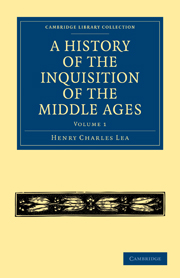Book contents
- Frontmatter
- PREFACE
- Contents
- BOOK I—ORIGIN AND ORGANIZATION OF THE INQUISITION
- CHAPTER I THE CHURCH
- CHAPTER II HERESY
- CHAPTER III THE CATHARI
- CHAPTER IV THE ALBIGENSIAN CRUSADES
- CHAPTER V PERSECUTION
- CHAPTER VI THE MENDICANT ORDERS
- CHAPTER VII THE INQUISITION FOUNDED
- CHAPTER VIII ORGANIZATION
- CHAPTER IX THE INQUISITORIAL PROCESS
- CHAPTER X EVIDENCE
- CHAPTER XI THE DEFENCE
- CHAPTER XII THE SENTENCE
- CHAPTER XIII CONFISCATION
- CHAPTER XIV THE STAKE
- APPENDIX
CHAPTER VI - THE MENDICANT ORDERS
Published online by Cambridge University Press: 29 August 2010
- Frontmatter
- PREFACE
- Contents
- BOOK I—ORIGIN AND ORGANIZATION OF THE INQUISITION
- CHAPTER I THE CHURCH
- CHAPTER II HERESY
- CHAPTER III THE CATHARI
- CHAPTER IV THE ALBIGENSIAN CRUSADES
- CHAPTER V PERSECUTION
- CHAPTER VI THE MENDICANT ORDERS
- CHAPTER VII THE INQUISITION FOUNDED
- CHAPTER VIII ORGANIZATION
- CHAPTER IX THE INQUISITORIAL PROCESS
- CHAPTER X EVIDENCE
- CHAPTER XI THE DEFENCE
- CHAPTER XII THE SENTENCE
- CHAPTER XIII CONFISCATION
- CHAPTER XIV THE STAKE
- APPENDIX
Summary
In the struggle which the Church was making to regain its forfeited hold upon the veneration of Christendom its most efficient instrument was not force. It is true that the dignitaries at its head relied solely on persecution, and by skilful use of popular superstition and princely ambition they succeeded in crushing the open revolt which threatened its supremacy. Something more was required to render that success permanent by arousing anew the trust and confidence of the people, and that something could not be supplied by a worldly and ambitious prelacy. Far down in the ranks of the Church, however, were men with truer insight and nobler aspirations, who saw its fatal omissions and who sought in their humble spheres to do the work which lay immediately around them. They builded better than they knew, and to them rather than to the Innocents and the de Montforts did the hierarchy owe the restoration of the tottering edifice. The response which they met showed how deep was the popular longing for a church which should in some degree fitly reflect the precepts of its Founder.
It is not to be supposed that the corruption of the ecclesiastical body was allowed to pass unnoticed and unreproved by the pious among the orthodox, and that occasional efforts at reform were not made by those who would have shrunk with horror from open opposition or even secret dissidence.
- Type
- Chapter
- Information
- A History of the Inquisition of the Middle Ages , pp. 243 - 304Publisher: Cambridge University PressPrint publication year: 2010First published in: 1888

